It is extremely common for politicians, journalists and the establishment to claim Britain (the United Kingdom – UK) has no written, codified constitution. In Part 1 we explored why they might want to do this.
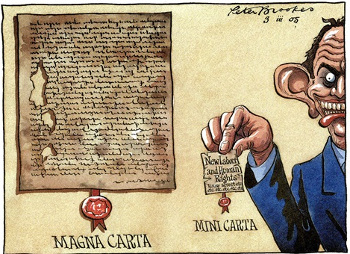
The idea that Britain has no codified Constitution is not true. Britain has a single, written constitutional document. The Great Charter of England, referred to simply as the Magna Carta since 1217.
To be ‘codified’ a written Constitution must be ‘authoratative,’representing a higher law than mere legislation. It must be ‘entrenched,’ virtually impossible to amend or abolish, and it must be ‘judiciable,’ meaning other laws can be judged against it to determine if they are constitutional. The Magna Carta meets all of these criteria.
On the 15th June 1215, at Runnymede on the banks of the Thames, King John gave his seal to sign the Magna Carta. It was a contract (compact) between the Crown (head of State) and the people. It was a constitutional inscription of the people’s Common Law. A declaration of liberty which limits the power of the state under the Rule of Law, through the mechanism of [judicium parium] Trial by Jury.
John had been acting unlawfully for a number of years. Feudal monarchs, contrary to popular myth, were bound by the terms of their coronation oath to uphold the Law of the Land, the customs and rights of the people. The widespread theft, fraud and violence, meted out by John and his lunatic fringe of homicidal rapists, clearly placed him in breach of his oath.
His equals, the noblemen, made him sign the Magna Carta to compel him to honour his coronation oath and restore the Rule of Law. Magna Carta did not create the Law of the Land but rather created a Constitution which codified it as the Common Law.
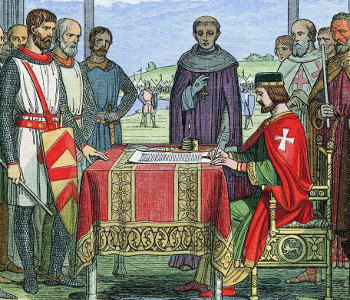
It laid down, in law, the peoples customs and rights including no taxation without representation, the right to justice [habeas corpus,] the right of redress and remedy, the outlawing of usury and the right to lawful rebellion etc. It also defined the Rule of Law (Common Law) as the ‘will and custom’ of the people. It is important to understand that the original Magna Carta decreed that the Crown could never breach its coronation oath to uphold the laws of the land.
The Head of State was compelled to uphold the Rule of Law at all times. They could neither violate nor alter Common Law, as stipulated by the 1215 document, absent a renegotiation between the signatories. The signatories were the Crown and the common people.
By 1225 there had already been three attempts to change Magna Carta (1216, 1217 & 1225.) They all breached of the Crown’s oath, were unconstitutional, and therefore had no effect in law. Modern interpretations, which claim the 1215 Magna Carta only lasted a few months, fundamentally misunderstand that is was an inviolable Constitution. It’s principles cannot just be changed by anyone without a renegotiation of the British Constitution. Not then and not now.
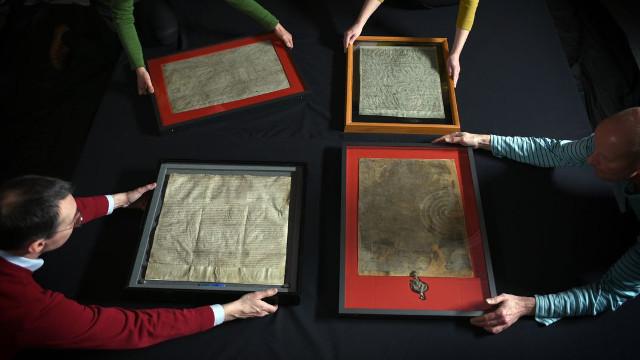
We often see commentary stating that the Magna Carta meant this, or it didn’t mean that. Nearly all of these commentaries focus upon the subsequent, unconstitutional reiterations of the original 1215 Constitution. None of these rehashes of the true Magna Carta are legitimate. Commentary upon them has no relevance to the British Constitution.
Magna Carta rendered dictatorship impossible because the absolute Rule of Law was established. It restated the rights and customs of the people in its Articles of Common Law. All constitutional power is invested in the Crown only by virtue of the Crowns unbreakable contract with the people (Common Law.) The Crown is sovereign over Parliament but has no sovereignty over the people, under the Rule of Law (Magna Carta 1215 – Articles 24, 36, 39, 40, 61 etc.)

Magna Carta predates Parliament. Only the signatories, the Crown and its subjects, the common people, can breach the terms of the compact (contract.) It is a mutual, binding agreement of indefinite duration. It is the Common Law Constitution Magna Carta of 1215.
Any breach merely has the effect of giving the offended party the right of redress (remedy.) Parliament were not signatories and they have never had any authority to amend or repeal any of it. Though that hasn’t stopped them claiming otherwise.
Magna Carta codified the following constitutional arrangement.
- Common law (the Rule of Law) is the will and custom of the people.
- Statute law is the will of Parliament. Statute can give expression to Common Law, but Common law cannot be disregarded or contravened by Parliament, nor can it be repealed.
- No Briton is above the law. Including members of Parliament and the Monarch.
- Parliament is made by the law, and is not above it.
Almost from the outset, attempts were made to place an amended Magna Carta on the Statute Books. The reason for this is pretty transparent. Parliamentarians can create or destroy legislation. They can’t destroy or amend a constitutional compact they weren’t party to. So all claims of repeal or suggestions that Magna Carta is a statute are wholly invalid. Over the centuries successive UK Parliaments have done what they can to wrestle the British peoples’ rights away from them; to fraudulently claim more power for themselves.
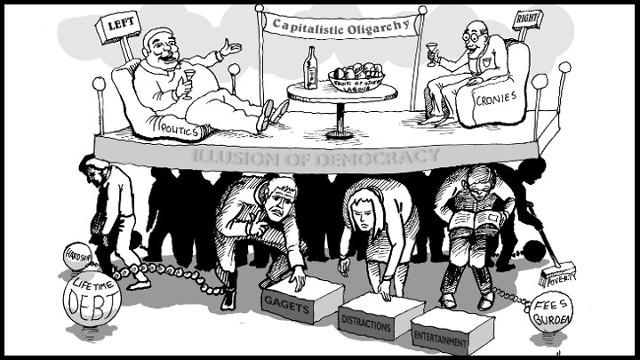
By looking at these attempts, we can see they have consistently been unable to do so. The Rule of Law (the Common Law) is unquestionably above the legislation of Parliament and, try as they might, they cannot undo any aspect of it. So they have instead operated centuries of obfuscation, misdirection and outright lying to try and hide the fact that the people are sovereign, not Parliament. It is truly a conspiracy.
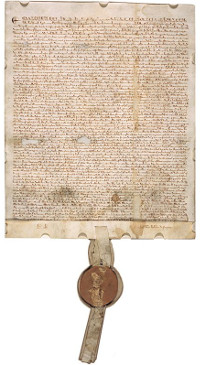 Edward I passed the 1297 Confirmation of the Great Charter Act which supposedly passed the (illegitimately amended) Magna Carta onto the statute books. In reality, all it did was copy parts of it into legislation. The original 1215 British Constitution remained unaffected. As it has ever since. However the only interesting aspect of the Confirmation Act is that it revealed the core problem for those who want to take power for themselves. It stated:
Edward I passed the 1297 Confirmation of the Great Charter Act which supposedly passed the (illegitimately amended) Magna Carta onto the statute books. In reality, all it did was copy parts of it into legislation. The original 1215 British Constitution remained unaffected. As it has ever since. However the only interesting aspect of the Confirmation Act is that it revealed the core problem for those who want to take power for themselves. It stated:
“And we will that if any judgement be given henceforth contrary to the points aforesaid by the justices or by any other (of) our ministers that hold plea before them against the points of the charters it shall be undone and holden for nought.”
Meaning the customs and rights enshrined in the Magna Carta cannot be breached by any Parliament. If they try, their legislation means nothing.
The key to Parliamentarians desperation to repeal the British Constitution is found Clause 39 of the Magna Carta, which states:
NO freeman shall be taken or imprisoned, or be desseised of his Freehold, or Liberties, or free Customs, or be outlawed, or exiled, or any other wise destroyed; nor will We not pass upon him, nor [condemn him,] but by lawful judgement of his Peers, or by the Law of the Land. We will sell to no man, we will not deny or defer to any man either Justice or Right.
In other words any person who is accused of breaking ‘any law,’ including Acts of Parliament, has an absolute, inalienable right to a trial by a jury of their peers. Income cannot be an impediment to accessing justice and all are born with a Common Law right to justice .
As we discussed in Part 1 ‘Annulment by Jury’ empowers the peoples’ jury to repeal Acts of Parliament if they find the legislation to be unjust. It is this element of the British Constitution which Parliament has consistently tried to seize or deny.
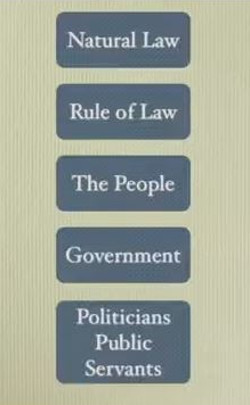
Parliament does not have unlimited power. There are means of redress and remedy for the people under the British Constitution. These rights were first codified in the Magna Carta and subsequently reaffirmed by every attempt to undermine it with Statute Law.
For example, following the Glorious Revolution of 1688, two constitutional documents emerged which incidentally reinforced the rights enshrined in the Magna Carta. The Declaration of Rights 1688 and the subsequent statutory Bill of Rights in 1689. William III refused to sign the Declaration of Rights, rendering it meaningless in law, but agreed to give Royal assent to the Bill in exchange for the Crown.
On the 26th January 1688 (at the time, the year changed on the 25th of March, so we view this as January 1689 today) the victorious William of Orange (William III) held a convention to address the abuses of power wrongly assumed by his vanquished predecessor. James II of England (James VII of Scotland) had usurped the Rule of Law in 13 distinct ways. William agreed to remedy this upon his own coronation.
The 13 constitutional changes were written into the Declaration of Rights, which effectively represented the settlement terms for the Glorious Revolution. This brought an end to the Divine Right of Kings (absolute power of the Monarchy,) an unconstitutional authority assumed by James VI of Scotland. The concept of the Divine Right of Kings had been removed by Magna Carta but had reemerged over the centuries, as a succession of monarchs tried to usurp the constitution. However, as the Crown is the Head of State, the Bill of Rights forced the state’s compliance with the principles defined by Magna Carta. Much to Parliamentarians annoyance.
James fled leaving the crown vacant. William was offered it in a coronation ceremony on the February 13th 1688 (1689) where he agreed to accept the Crown on the understanding he would protect the principles within the Declaration of Rights. Parliament then took the Declaration and incorporated it into the Bill of Rights and, as agreed, William gave it Royal assent.
Again, the politicians objective was to give the ‘Estates of England’ (Parliament) control of the ‘legislation.’ The Bill of Rights was another attempted power grab. Fearing ‘Annulment by Jury’ the Bill limited who could be selected for jury service. Ensuring the power elite could rig the jury to protect their unconstitutional power.
The 1689 (1688) Bill of Rights has been interpreted by Parliament, over the years, to mean Parliament is sovereign. This is not the case. Not only does the text itself make no such claim, but the attempt to usurp the Articles of Common Law and limit Trial by Jury was unconstitutional. Try as they might, The Rule of Law remained authoritative above the legislation of Parliament.
The principle of none being above the Law (including monarchs and Parliament,) as stated in the Magna Carta, was firmly reaffirmed in the 1670 trial of Penn and Mead, less than a year later.
Quaker preachers Penn, who went on to found the American State of Pennsylvania, and fellow preacher Mead, had drawn a large crowd in Cracechurch Street, London. They were arrested and charged with ‘unlawful and tumultuous assembly.’ At the trial, the jury refused to find either men guilty as charged.
Acting completely unlawfully, the bench tried a variety of strong arm tactics, including imprisonment, to force the jury to find the defendants guilty. They refused and the court, who were simply bullying and intimidating the jury, unlawfully fined Penn, Mead and the Jury for contempt of court, sending all to prison until the fines were paid. This was nothing short of attempted extortion.
However, upon release, the foreman of the jury Edward Bushel, who had refused to pay the contempt fine, pursued common law justice. The case was heard by Chief Justice John Vaughan at the Court of Common Pleas. Vaughan initially tried to claim Bushel’s case could not be heard, but was ignored by other judges who issued the writ. of habeas corpus. Vaughan’s ruling reaffirmed the absolute Common Law right of free Trial by Jury, famously stating:
“The jury must be independently and indisputably responsible for its verdict free from any threats from the court.”
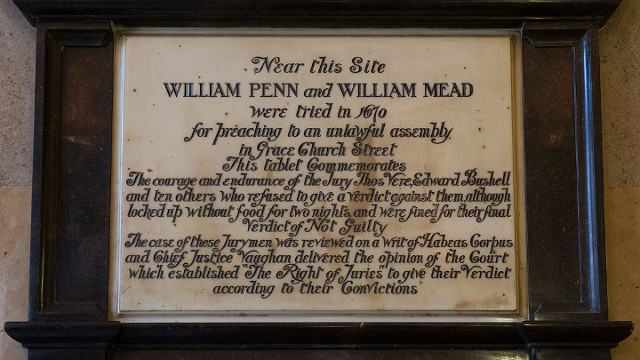
Just like the Magna Carta, the Declaration (copied into the Bill) invested power in the Crown, under the Rule of Law, over and above the rule of Parliament. In reference to the monarch, to be afforded the authority of Head of State, it stated:
“whose princely persons the royal state, crown and dignity of the said realms with all honours, styles, titles, regalities, prerogatives, powers, jurisdictions and authorities to the same belonging and appertaining are most fully, rightfully and entirely invested and incorporated, united and annexed.”
This confirmed that all constitutional power is entirely invested in the Crown and cannot be repealed or otherwise violated by Parliament. The 1688 Coronation Act laid down the responsibility of the Crown to uphold both the Rule of Law and the statutes passed by Parliament. However, no one, including Parliament, is above the Common Law of the people.
Before accepting the Crown the monarch must swear their oath to the following:
“Will you solemnly promise and swear to govern the people of this Kingdom of England, and the dominions thereto belonging, according to the statutes in Parliament agreed on, and the laws and customs of the same?”
This is an unavoidable, direct reference to the Magna Carta which recognised that rights and customs were of equal importance to the people, and both were equally protected. Article 13 states:
“And the city of London shall have all its ancient liberties and free customs…furthermore, we decree and grant that all other cities, boroughs, towns, and ports shall have all their liberties and free customs.”

The free custom of the British people is the Rule of Law (Common Law.) Therefore the power of the Crown was strictly limited by their oath to uphold these customs and rights. This contract, between the people and the Crown, was described in 1753 by Sir William Blackstone who wrote:
“However, in what form it so ever be conceived, this [the Coronation Oath] is most indisputably a fundamental and original express contract…….So that whatever doubts might be formerly raised by weak and scrupulous minds about the existence of such an original contract, they must now entirely cease; especially with regard to every prince, who has reigned since the year 1688.”
The Crowns contractual responsibilities were further defined in the 1688 Coronation Act as follows:
“…….by the Law and Ancient Usage of this Realme the Kings and Queens thereof have taken a Solemne Oath upon the Evangelists at Their respective Coronations to maintaine the Statutes Laws and Customs of the said Realme and all the People and Inhabitants thereof in their Spirituall and Civill Rights and Properties.”
In other words the Crown (Head of state) is compelled, not only to uphold the law, but also to protect the spiritual, civil and property rights of the people. This means Parliament is required, under Common Law, to do the same.
Parliament doesn’t exist to rule us or ‘allow’ our rights. Parliament exists to uphold our inalienable human and civil rights, protect our property and ensure the laws it creates serve those same objectives.
Furthermore, the Crown is also required to ensure all judgments are just and merciful. The Coronation Oath asks the monarch to commit to the equitable exercise of that lawful power:
“Will you to your power cause law and justice in mercy to be executed in all your judgements?”
Injustice is unconstitutional. This is why Trial by Jury, another constitutional right, is vital. Regardless of any breach of the letter of the law, no jury can ever lawfully be directed to give a guilty verdict, as the Penn & Mead cased proved. The power of ‘Annulment by Jury’ is entirely invested and incorporated, united and annexed through the peoples’ constitutional contract with the Head of State.
This makes it abundantly clear, Parliaments claim to sovereignty is not valid. The only power Parliament has is to form legislation. The bills which eventually pass the house are then presented to the Crown for Royal assent.
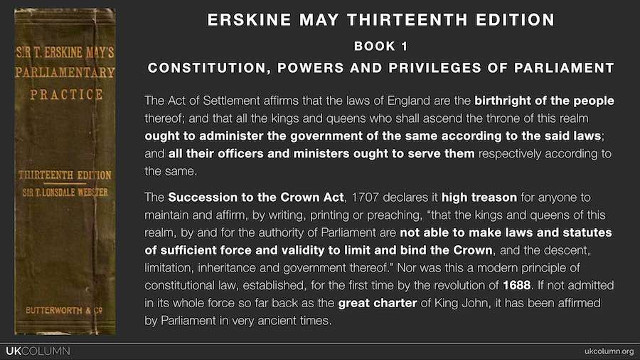
Legislation does not become law until the Crown agrees, and the Crown is bound by its contract with the people. Parliament do not pass laws. They merely suggest legislation. This only becomes Statute law with the constitutional consent of the people, represented by the Crown.
Through constitutional Trial by Jury, if the people subsequently find that the legislation creates unjust law they can annul it. The people can demand that Parliament amend or remove legislation from the statute books.
This is why, since 1215, there has been an 800 yearlong attempt by mendacious individuals serving corrupt organisations, occult private member clubs and corporations to hide the truth about the Magna Carta and the British Constitution from the people. With great success, it has to be said.
The British Constitution actually invests all power in the people. The people then lend this power to the Crown via their constitutional contract with the Head of State. Parliament is only allowed to create its legislation with the active consent of the people. The people can annul legislation if they subsequently decide it is unjust.
Parliaments own handbook (Erskin May) spells this out to members of Parliament (MP’s.) It is so unequivocal one wonders if those who have falsely claimed the sovereignty of Parliament have ever read it. On the constitution, powers and privileges of Parliament it states:
“The Act of Settlement affirms that the laws of England are the birthright of the people thereof; and that all kings and queens who shall ascend the throne of this realm ought to administer the government of the same according to said laws; and all their officers and ministers ought to serve them respectively according to the same.”
MP’s are nothing more than public servants. Parliamentary power is constrained by the British Constitution and the Rule of Law. This law is formed exclusively by the people through Trial by Jury.
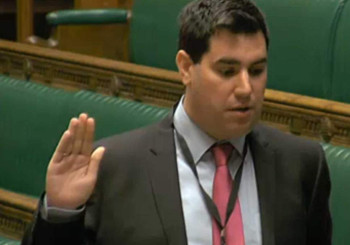
The Common Law is the principle upon which UK governance is founded. Parliament cannot act unlawfully. When MP’s are elected, by the people, they are required to swear an oath to the Queen before they take office.
This does not mean they have to swear allegiance to the person acting as monarch. They swear their oath to the power invested in the Crown, by the people. This is defined in the Parliamentary code of conduct. In reference to MP’s duty, it states:
- By virtue of the oath, or affirmation, of allegiance taken by all Members when they are elected to the House, Members have a duty to be faithful and bear true allegiance to Her Majesty the Queen, her heirs and successors, according to law.
- Members have a duty to uphold the law, including the general law against discrimination.
- Members have a general duty to act in the interests of the nation as a whole; and a special duty to their constituents.
- Members should act on all occasions in accordance with the public trust placed in them. They should always behave with probity and integrity, including in their use of public resources.
We all know that British democracy doesn’t function as it should. Powerful corporate interests are able to use their immense resources to lobby, bribe and blackmail politicians to do whatever they want. Parliament certainly does not serve the people. We only need look at the recent Brexit debacle to understand that voting only counts if you vote for the establishment.
If you vote against it, as 17.4million Britons did, the will of the people is ignored. The question is what do we do about it?
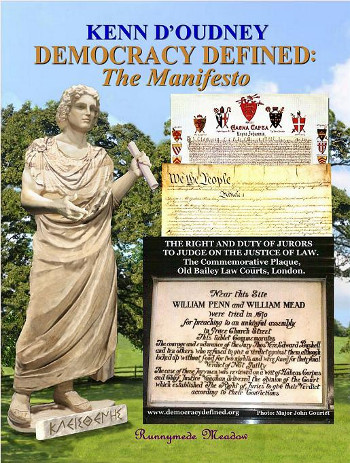
Firstly, arming yourself with knowledge is key. You can’t expect to learn any of this from the mainstream media, the political establishment or even most published academic opinion. All law students are wrongfully taught that Britain has no written codified constitution. Only the few legal professionals, who have done their own independent research, come to realise the truth. They risk their careers when they speak up about it.
This is no accident. All institutions of state are currently controlled by the same, corrupt corporate interests, and they don’t want the people to know about any of this.
Do some research yourself? Don’t believe anything you are told, especially by the likes of me, without first establishing the facts for yourself by considering the evidence.
I have linked to some important information resources throughout this article. The UK Column, The New Chartist Movement, The British Constitution Group, Democracy Defined and others. Take a look. See what you think.
If you come to the conclusion that we have been subject to a centuries old conspiracy to hide and deny the British peoples’ constitutional rights, the next step is to spread this information as widely as possible. Don’t allow anyone to say that Britain has no codified Constitution without question. Respectfully challenge them, and tell them why you don’t agree. More importantly, show them the evidence.
Support those who are trying to disseminate this information and speak up when the establishment try to censor or deny it. Demand to see the proof of their claims.
If more people are aware of what has been done to them, eventually their numbers will reach a critical mass, compelling the debate. At that point, for the first time in more than 800 years, we may stand a chance of forcing the political establishment to honour the written, codified British Constitution. The Magna Carta.

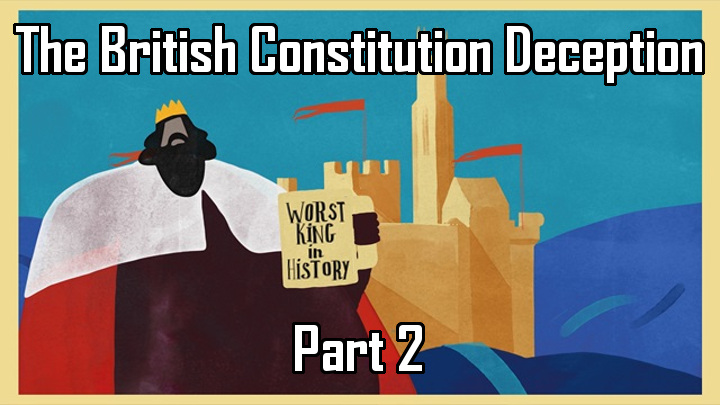



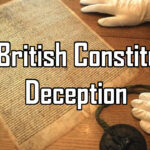
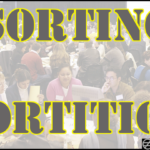


Great stuff. 🙂
I found this very eye opening, have posted on face book to people asking they look at this in depth , more people need to start questioning this , we need to get our Democracy back, thank for pointing me to this.
You’re welcome Carole. Thanks for sharing.
Very interesting article.
Hi If our law is codified we cannot legally be in the EU or is that wrong, we were taken in onlies and deception, and if that is true Blaire could not abolish or ammend Treason laws?
love your articles.
Thanks Jacque. The Lisbon Treaty in particular seems unconstitutional. It forces the Crown to break their oath to us, the people, which they cannot do without our consent. We never gave our consent for the ratification of that treaty. Also we were deceived when entered the ‘common market.’ We were not given full disclosure. Again unconstitutional. However this is the big problem. The state does not recognise the constitution. In fact they have made a concerted effort over 800 years to make sure none of us recognise the constitution. So we need to work to raise awareness and get more people to realise how powerful our codified constitution is. thanks very much for the comment.
How can we make more people aware and can we use this as a legal stand Parliament are doing all they can to thwart brexit how can we make a difference?
Hi Jacque, there are organisations out there trying to raise awareness of these issues. I know I intend to support them.
The Common Law Courts: https://www.commonlawcourt.com/
The British Constitution Group: https://www.britishconstitutiongroup.com/
The New chartis Movement: https://www.newchartistmovement.org.uk/
Also I highly recommend reading Ken d’Oudeney Democracy Defined: The Manifiesto https://www.britishconstitutiongroup.com/
Excellent article. Some time ago I registered my date of birth with the Common Law Court, as ‘A Living Person’and not ‘dead’ as in statute law.
Thanks Poppy. Yep something I’m also considering.
Thank you very much Iain for very helpful articles. Did you decide to register with Common Law courts? Is our information safe with them? I’m wondering if i can trust them?
Thanks Sumy – No I haven’t yet. Still thinking about it and I don’t know about data security.
Excellent and enlightening
I would very much like to cite this article (in full with credits) in the new year on my website (still under construction) I hope that will be OK ?
Yes of course. Check out my Creative commons license. All I ask is for an accreditation link.
https://iaindavis.com/legalinf/
I have spoke to William, and I have read your article.. I would like to talk to you about some things, which unfortunately your not picking up on. How can I contact you? There is no lawful monarch. You are misinformed about what the Crown means. Ill politely explain. Cheers
Thanks. I’m interested to hear you view. Please contact, either by leaving further comment or email me at [email protected]
So if it is Law how do we make the Courts and Government obey it? If I appear in Court how can I implement and use it? Without waiting for a lot of people to force the Govts hand as it will undoubtedly take years.
Thanks Phillip. I don’t think we can expect British courts to openly act in keeping with our constitution. Court is best avoided and the cards are stacked against all defendants who enter one. I am not qualified to give you any legal advice but I agree the process of making the political and judicial establishment honour our written constitution will be both a lengthy and extremely difficult task.
In the meantime the best we can do is act lawfully at all times and resolve our disputes in common law courts. Perhaps if increasing numbers of us do so, a parallel system of civil law can be created. It will never be acknowledged by the current judiciary, but if sufficient numbers use common law instead of maritime law courts perhaps this will lead to increasing recognition among the public of the supremacy of the Rule of Law. It is a race against time as we see increasing attempts to erode our constitution but we cannot reasonable expect the people seeking to destroy the constitution to then honour it.
We need to honour it regardless of the establishment.
Hi Iain
I’ve read (and enjoyed) many of your articles on platforms such as Off-G, UK Column and listened to you talk with James Corbett. However, I think there’s a colossal ‘elephant in the room’ that you consistently & repeatedly miss and it’s woven throughout the fabric of much of your writing. This particular article is yet another example.
In it, you state “On the 15th June 1215, at Runnymede on the banks of the Thames, King John gave his seal to sign the Magna Carta. It was a contract (compact) between the Crown (head of State) and the people.”
Although I’m acutely aware that facts & evidence are a crucially important part of your writing, there isn’t a single shred of evidence (and absolutely zero facts) that “the people” (a.k.a. the general population) then living ever agreed to it.
Moreover, even if they did, they’ve all been dead for hundreds of years now, so how would that bind those of us living today to any kind of contract?
Amongst many, many other voluntaryist, Corbett also cites Lysander Spooner’s “No Treason – The Constitution of no Authority”, which brutally dispels the myth of any kind of social contract between “the people” and their supposed rulers.
I’m not sure if you’ve ever read Spooner’s short essay (if not, I strongly recommend it), but if you have, I’m curious to know how you could ever think that documents such as the American Constitution or the Magna Carta have any merit/validity whatsoever?
Thanks Rich. Excellent comment. This is no cop out I will get back to you and yes I have read Spooners collected essays (though your comment has made me want to revisit them.) But just quickly I think you (and Spooner) misinterpret what the Magna Carta was (I know little about the U.S. constitution). Magna Carta was not a nebulous “social contract” It was a real physical contract that sealed the demand that the rule of law (judicium parium – governance by trial by jury) be the whole of the law.
This was already the custom of the people. It predated the formation of the England and the subsequent United Kingdom. The purpose was not to establish “rulers” but to firmly, once and for all, establish that the Crown (head of state) was the embodiment of the people. That is to say the people rule absolutely by trial by jury. Government existed only by the will of the people and the people had absolute power to overrule it at all times in a jury trial which could annul any and all legislation. It is a contract which “allows” government to exist. But equally it can end government if they breach the terms. Which they have constantly.
To illustrate what it would mean if we fully enforced the Magna Carta we can use the recent Human Intelligence Act through which the government have given themselves carte blanche to commit any crime they like. If Magan Carta was recognised as the constitution the people would have a “duty” to rebel. They could convene a grand jury of randomly selected citizens who would certainly annul the legislation. Government would have no power to pass dictatorial measures. The people could and would deny them that claimed right.
John was not a King. He was in breach of his oath and had forfeited that position. But he and his mates were riding around the country killing people for fun. Magna Carta was first and foremost an attempt to stop any such government crimes ever happening again. It did this by placing the rule of law in the hands of the people, and exclusively the people, and setting that above government (kings, queens and despots) forevermore. It failed because it was ignored by the usual suspects (the power mad). Like you and Spooner I see no need for government at all. Magna Carta creates that possibility in law.
If you haven’t I recommend you read Democracy Defined By Ken D’Oudney to see what I mean. Spooner was right the idea of a social contract (or prescriptive constitution) is absurd, but that is not what Magna Carta was in my opinion. As for no one agreeing to it you have a point as we only have texts of the time to know how the court Baron (courts of the 100) worked.
But looking to how a voluntary society could work, assuming you don’t want it to be lawless (I know I don’t) then nothing comes close to laying out that framework as well as Magna Carta in my view. Based upon the NAP we could have a functioning voluntary society with such an arrangement.
Though, for anarchy purists, calling it a “constitution” probably wouldn’t be welcome. No matter, the point is it puts all power in the hands of the people and not government. Which I believe is something worth advocating.
This is why governments are so keen on migration and balkanization of ethnically homogeneous countries or polities. If you could institute this scheme there would be areas of England that are under control of Sharia Law and areas under Jewish Rabbinical Law. Quite what the godless atheists of the remnant English Anglo-Saxon population would come up with I shudder to think. Judging, for instance, by people I used to work with (I’m retired now and living in a foreign country) it would not be pretty. They certainly at the very least paid lip service to values I consider abhorrent, such as homosexual marriage – the Church of England is a Satanic clown show. Be careful what you wish for.
Thanks John. I understand your concerns but personally don’t share them. I don’t consider any “culture” or ethnicity to be inherently superior or inferior to any other and have enjoyed living in “multicultural” communities both in the UK and abroad. I do think there are problems with rapid mass migration, such as maintaining access to public services, which we need to be conscious of. What matters in my view is that we appreciate what the real constitution states, namely that the rule of law is the custom of the people and it means governance by trial by jury. I doubt any modern nation state will ever concede this reality. Therefore I suggests it is up to us to re-establish it. You might find this interesting: – https://iaindavis.com/long-live-democracy/
The issue is demographics. As things currently trend in another 50 years people will be posting on blogs about how to implement Sharia Law in England. Culture is downstream of ethnicity. You only have to drive through various parts of England to see that, the writing is on the wall.
I agree John. People are already arguing for the implementation of Sharia Law in England and I am broadly opposed to all culture. Sharia law is just another corrupt legal system in my view, this time founded in theocracy rather than secularism. I am certainly not arguing for it. But what are we, as a society, offering to oppose it?
A “legal system” so corrupt that money is the defining factor determining guilt. If we wish to resist the imposition of another corrupt legal system, Sharia law for example, then I suggest we first need to understand what our real system of law should be. Our constitution states that Common Law, administered by juries who judge “guilt” based upon Natural Law, is the custom of the people. That is not what we currently have and it is not reflected by our present “legal system.”
So what chance that the PTSB will ever re-establish the real constitutional rule of law when the current corrupt “legal system” is purpose built for their benefit? Similarly, the only way we will ever have Sharia Law in this country is if that provides some sort of benefit to our corrupt so-called leaders in addition to the protection that the current system already provides them.
We can’t expect the criminals who people keep electing to observe any of these constitutional standards. Nor can we expect them to change their minds through any rational argument we make. They are corrupt, that’s the point. If we want to re-establish the constitutional rule of law then we have to convene common law courts ourselves. We have to live as if the constitution were observed. Acting honoroubly in all contracts and living honest lives that cause no harm.
If we can establish this system among ourselves, if we turn our backs on corrupt power and stop engaging in their system then, over time, societal change is possible. But if we simply continue protesting against rampant corruption and asking the corrupt to change their ways and provide a better system for us, then we will fail.
We need to create the world we want without them. It is the only way in my view.